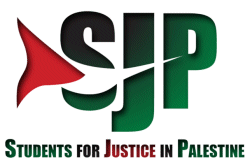Students for Justice in Palestine - History
 The Student Movement was reportedly founded in 1993, though this initial incarnation does not seem to have amounted to much. Most sources report it was founded at the University of California, Berkeley, in 2001. Over the past decades it has had more than 200 branches within various American universities [other sources report more than 250, and more than 80 chapters in 2010 ]. Most of its activity was concentrated in the Northeast, Midwest, and California (there are some chapters in Canada). It organizes lectures and gatherings, and publishes various materials through its social media accounts and campus newspapers. Some SJP chapters in the United States have adopted the name of the Palestine Solidarity Committee or Students for Equal Rights for Palestinians. In Canada, some SJP chapters have adopted the name Students Against Israeli Apartheid ( SAIA ), or Solidarity for Palestinian Human Rights ( SPHR ).
The Student Movement was reportedly founded in 1993, though this initial incarnation does not seem to have amounted to much. Most sources report it was founded at the University of California, Berkeley, in 2001. Over the past decades it has had more than 200 branches within various American universities [other sources report more than 250, and more than 80 chapters in 2010 ]. Most of its activity was concentrated in the Northeast, Midwest, and California (there are some chapters in Canada). It organizes lectures and gatherings, and publishes various materials through its social media accounts and campus newspapers. Some SJP chapters in the United States have adopted the name of the Palestine Solidarity Committee or Students for Equal Rights for Palestinians. In Canada, some SJP chapters have adopted the name Students Against Israeli Apartheid ( SAIA ), or Solidarity for Palestinian Human Rights ( SPHR ).
The movement states it seeks to educate students and faculty members alike about the current situation in Palestine and the issues related to the Palestinian people. The movement indicates on its official pages that its mission is to defend Palestinian rights, as well as to demand justice and equality for all oppressed people around the world. The group's focus is on increasing awareness of the Palestinian issue and understanding the Palestinian struggle for freedom, justice and equality, but at the same time it stands against all types of discrimination and racism, including misogyny, anti-Islam, anti-Semitism, classism, colonialism and intolerance. The movement also aims to enhance political awareness of liberation movements, such as the Black Liberation Movement and the Indigenous Liberation Movement.
In February 2018, the New York City chapter of Students for Justice in Palestine was renamed Within Our Lifetime (WOL). The organization calls for upholding the right of return for all Palestinian refugees to their homeland in all of historic Palestine from the Jordan River to the Mediterranean Sea. And anti-Zionism, which it sees as a white supremacist, settler-colonial ideology based on genocide and dispossession of the Palestinian people. It upholds the right to resist and engage in all forms of struggle in pursuit of freedom.
Student movements throughout history have contributed to shaping social awareness and destabilizing and delegitimizing oppressive regimes. Among them have emerged movements demanding the amendment of a law or carrying out specific reforms related to unemployment, health, or education, and other movements against wars or colonial and racist regimes, such as anti-segregation movements against racism in South Africa.
The Students for Justice in Palestine” (SJP) movement joined other influential student movements, and over two decades was able to change the face of American public opinion, especially among the younger generations, as opinion polls showed that more than half of them believed in the necessity of liquidating the colonial project as a just solution to the issue. The “Students for Justice in Palestine” movement culminated in this as the most influential student movement in the American scene, after which the systematic series of intimidation, harassment, and besiegement against them began.
The idea of a student organization calling for the liberation of Palestinian land is not new. In the 1950s, the General Union of Palestine Students (GUPS) was formed as a basic structure for the student struggle for liberation in American university circles. From the U.S. to Palestine, GUPS chapters galvanized thousands of students towards a liberated Palestine. However, Oslo and the accompanying undermining of the concepts of national struggle prevented the student movement from continuing in its usual form in universities. The 90s’ wave of corrupt politicians and faulty deals changed the liberation movement and many institutions, including the student movement, collapsed.
This situation led to the formation of the “Students for Justice in Palestine” movement as a new structure that leads the political struggle through education, awareness-raising, mobilization, and mobilization in support of the Palestinian cause. Although the first branch of the movement was founded in Berkeley College, California, in the 1990s, it was only officially active early in the current millennium.
The sub-student movements distributed among American and Canadian universities are organized under the umbrella of the mother movement: “The National Movement of Students for Justice in Palestine” (NSJP), and the branches of the movement spread across the various American universities and colleges operate on a high degree of administrative organization and structural hierarchy, as most of them have adopted It established movement constitutions and internal laws to regulate its work, and it also actively managed websites and specialized pages on social media sites. The umbrella seeks to unify student work and enable sub-movements to exercise their role in demanding liberation and the right to self-determination for the Palestinian people, by linking them to a communication network that works to train and organize them, raise their level of familiarity with the issue, provide advice, and provide them with the necessary tools for effective political participation on university campuses.
|
NEWSLETTER
|
| Join the GlobalSecurity.org mailing list |
|
|
|

